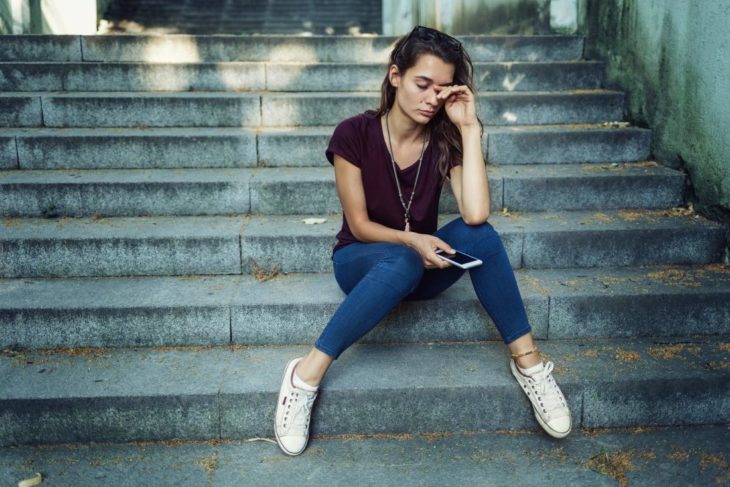I used to be the sort of person who was always looking for the next big thing. In high school, I wanted to be in college. In college, I wanted to have a job. Every job I had, I wanted to be more successful.
I didn’t learn about stillness, about just being, until I had to. And I don’t think it’s coincidental that the more I just be and the more gratitude I have for my life, the happier I am.
My bouts of depression have always had a chicken-and-the-egg quality to them. Was I on a downward spiral of depression throughout my mid-20s? Or was it from my stressful and demanding job and how hard I was on myself about not being the most amazing person ever? Did I feel depressed because I studied abroad in Eastern Europe away from my family and my friends? Or was I depressed already and that trip just exacerbated it?
I don’t think there are necessarily answers other than “both.” Just the way my mom is inclined to bruise easily if she knocks her leg on a coffee table, I’m inclined to get depressed easily. I wouldn’t have chosen to be this way if I had the choice. But since this is what the lottery stuck me with, I’ve learned how to cope with it.

Source: Medical News Today
There’s a song by Ani Di Franco that I used to listen to a lot in college, coincidentally enough when I was depressed while studying abroad in Prague for a semester. I think “Slide” might be a breakup song for Ani, about getting over a lover. But for me it’s a song about being stuck in depression and having to get yourself unstuck. It’s about being sick and having to get yourself well.
She laid down in her party dress and never got up / Needless to say she missed the party / She just got sad, then she got stuck /She was wincing like something brittle, trying to hard to bend / She was numb with the terror / She was losing her best friend / We never see things changing / We only see them ending / And some vicious whispering voice kept saying / You have no choice, you have no choice
I did hear that vicious whispering; it was palpable. You have no choice, you have no choice. I could continue to lay in bed for hours and hours every day and only experience life with all the colors drained out of it. I could carry in my chest the darkness that at once felt heavy and hollow. But I refused to believe that was the only option. As much as I felt stigmatized and strange for feeling a way everyone else seemed not to, it served as a sort of inspiration. This is a riddle for me to crack; this is a puzzle for me to solve.
It took a long time to feel not just not-sick or neutral, but happy. I’m not going to sugarcoat it and pretend it was quick or easy. Constructing a liveable life for yourself is one of the most difficult things I know. I had to do a lot of pruning in my social circle: taking away or putting-at-arms’-length the energy drainers, whether they were acquaintances, colleagues or family members. I had to decide only to work for people who treated me with the respect that I deserve (and then find those people and get them to employ me). I had to make wiser decisions about dating and then, when my heart got broken anyway, dust myself off and try again. I had to take better care of myself: getting the right amount of sleep (not too much or too little), doing talk therapy, not drinking or using drugs to make myself feel better, eating more healthfully and regulating my moods with anti-depressants. When I do all these things, I feel not-sick and neutral. And lately, because I am very lucky, I feel happy.
It’s always surprising to me when it happens: I’ll be walking on a fall afternoon with my boyfriend, the air crisp, and just buying a $1.50 slice of pizza will make me swell with joy. Or I’ll be lazily floating in a public pool. Or walking down the street and discovering there is an entire restaurant devoted to mozzarella. What’s that feeling? I’ll ask myself. I … actually … feel …

Source: Diego Mangabeira
But just like I don’t want to sugarcoat the work it took get better, I don’t want to sugarcoat how privileged I feel to even be in that place. Having (some) money helps. I know people who can’t afford talk therapy or antidepressants that I think would benefit from them and that makes me feel sad about the state of mental healthcare in this country. I took on a second job on weekends back in June (despite the long-standing truism for me that working too much/too hard isn’t good for me — I guess I’ll see how that goes) and the extra cash is helping to lift the anxiety of student loan debt. I used to feel riddled with anxiety about debts. Money certainly doesn’t buy happiness but helps solve some problems, that’s for sure! And I feel grateful that I have the option to work for those resources.
I’m far too experienced with the ups-and-downs of depression — I once described it as a pendulum, which is apt — to trust that I’ll feel this good forever. But I do think that with age and experience I’ve learned better how to care for myself, both when I’m sick and when I’m not sick. The learning curve is over; I’m 28 now and I’m in such a better place to take care of myself than I was at 15 or 19 or 24. I actually feel empowered to take care of myself if I feel bad, which in turn, is a good feeling.
It got better for me. I have faith it can get better for you, too.
Original by:
